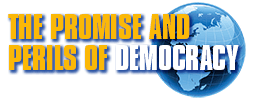Threats to Democracy was a topic high on the agenda of political scientists at their recent and most important annual conference, the American Political Science Association Annual Meeting (APSA), where political scientists discuss trends and findings within their field. This year the rise of authoritarianism, autocratic nationalism, disregard for the rule of law, and remedies were important topics. Contributions revealed some startling findings:
The session “Populism and Militant Democracy,” for example, discussed the “Janus-faced nature” of contemporary populism: while populist candidates and parties compete in democratic elections, they frequently use electoral success to limit democratic competition and to weaken the rule of law. To what extent can and should a liberal democracy defend itself against populists that compete in the democratic arena? The answers revolve around the trade-off between liberty and threats to that liberty. While “militant democracies” limit the scope of democratic competition, they may legitimately do so in order to preserve democracy over time. On the other hand, limiting competition from populist parties may take away an important corrective, thus reinforcing the populist narrative of elite control, and thereby undermining democracy even more.
In a panel that tried to bring together different empirical measures of populist attitudes among voters, a paper by Cristóbal Rovira Kaltwasser and Steven Van Hauwaert argued that voters who support populist candidates and parties have a conception of democracy that differs from liberal democratic norms. This notion can reconcile the observation that populists, on the one hand, fiercely defend the “sovereignty of the people” while, on the other hand, they maintain that contemporary democracies are ruled by “corrupt elites.”
A paper by Michael Bang Petersen, Mathias Osmundsen and Kevin Arceneaux that was presented at the 2018 APSA meeting but won the best paper award in the Political Psychology division this year, dealt with the “‘Need for Chaos’ and the Sharing of Hostile Political Rumors in Advanced Democracies,” Petersen and coauthors show how a subset of up to 40 percent of the US population is willing to spread false rumors and fake news not because they think they are true but to sow discontent with established elites and the political system as a whole. According to a survey conducted for this research, 40 percent of respondents agreed that “we cannot fix the problems in our social institutions, we need to tear them down and start over.” These findings highlight the threat to democracy posed by fake news in a novel way. People are not necessarily uneducated or too naive when spreading conspiracy theories and false rumors. Rather, for some voters, spreading false information is a way to undermine the political system.
